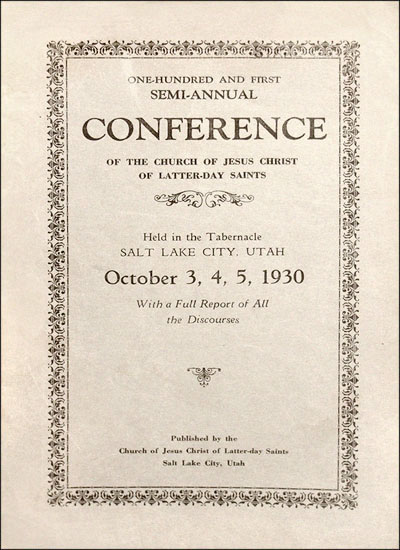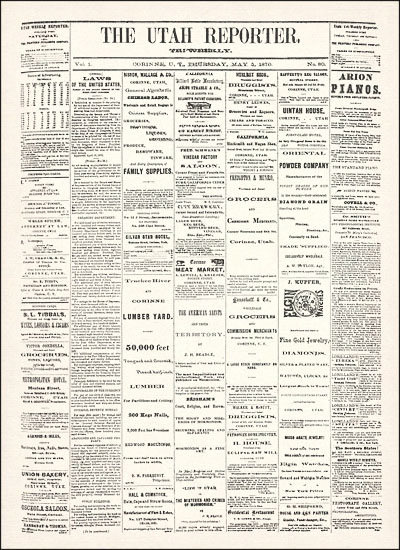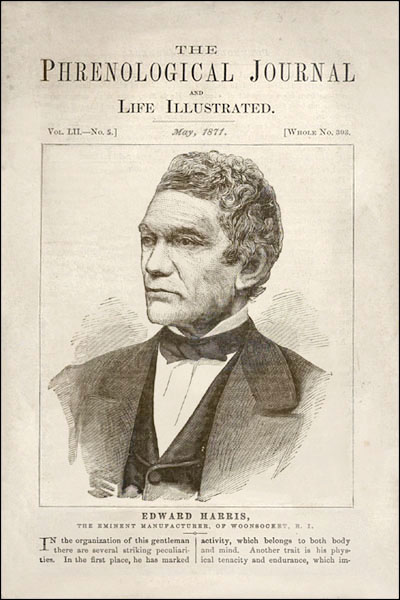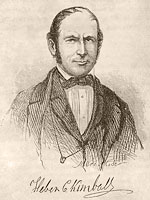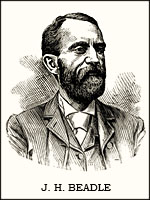THE
PHRENOLOGICAL JOURNAL
AND
LIFE ILLUSTRATED.

Vol. LII.
New York City, May, 1871.
No. 5.

[337]
THE UTAH GENTILES -- WHO AND WHAT THEY ARE.
[by Edward Wheelock Tullidge]
The Gentiles of Utah have of late become as conspicuous in the public mind as the Mormons themselves, and it may be interesting to the reader
to learn who and what they are. The Mormons stand for a modern Israel -- Gentiles converted to Abrahamic ideas and systems; while the Gentiles
are the un-Abrahamic peoples of the same races. It is an anomaly of distinctions, but a social fact; and as the Phrenological Journal is an encyclopedia
of character, it would hardly be complete without a group of those eminent persons who are at once a part of Utah and a misfortune to Mormonism proper.
GOVERNOR J. WILSON SHAFFER.
Dead, but living in his work, no man is more a live fact in Utah to-day than the late Governor Shaffer. On our trip to Salt Lake City we visited the man
whom the Gentiles and reformers esteem as the first and only Governor in fact of the United States' appointing since Brigham Young's term of office
expired. The Mormon President has been in reality the Governor of Utah for over twenty years, and it has been so understood by all the world.
The Government of the United States resolved at last to take Utah into its own harness. We shall not discuss with our friends the Mormons nor our friends
the Gentiles the abstract right or wrong of this, but simply state the fact. To find a man to execute the will of the Government was the important point, and
the appointment fell not upon a candidate for office. General Shaffer was the choice of President Grant himself, who selected him solely for the reason that
he esteemed him the right man to carry out the purposes of the Government in Utah affairs. Under the circumstances, General Shaffer left Washington with
the realization of a special purpose in his call to a new campaign, and he went up to Utah much in the same spirit that he went into the late war. This was
understood both by the
[338]
Gentiles and the Mormon leaders, and as the steady, inflexible character of General Shaffer was well known, very thorough measures were anticipated.
When the new Governor, however, arrived and was brought into frequent consultations with the Utah reformers, he became convinced by them that all that was
needed was a firm and judicious assertion of the national authority and supremacy, and not special legislation or extreme measures. Desiring nothing more
than this, and to be just and considerate over the family complexities involved in polygamy, he wished for a natural solution satisfactory to the Mormons and to
the nation rather than special legislation and the application of penalties for past acts. He, however, deemed it his duty, and strictly in the line of the purpose
for which he had been appointed, to take the militia out of the hands of the church authorities, displacing the acting Lieutenant-General. Here is the famous
PROCLAMATION.
"Executive Department, Salt Lake City,
Utah Territory, September 15, 1870.
"Know ye, that I, J. Wilson Shaffer, Governor of the Territory of Utah and Commander-in-Chief of the Militia of said Territory, by virtue of the
power and authority in me vested by the laws of the United States, have this day appointed and commissioned P. E. Connor Major-General
of the Militia of Utah Territory, and W. M. Johns Colonel and Assistant Adjutant-General of the Militia of Utah Territory. Now, it is ordered that
they be obeyed and respected accordingly.
[Seal.] "Witness my hand and the great seal of said Territory, at Salt Lake City, this the 15th day of September, A.D. 1870,"
J. W. SHAFFER, Governor.
GENERAL P. EDWARD CONNOR.
If the rank of the Gentile is to be estimated by the might of his antagonism to President Young and his Government, before us stands the first Gentile in all the
land. General Connor is also the most historical of his class in his relations with Utah.
Just after the breaking out of the late rebellion the "California Volunteers" were enrolled and placed under the command of Colonel Connor. The enthusiastic men
enlisted with the full expectation that they were going direct to the seat of the war to engage against the rebels. With this understanding they took up their line of
march toward Utah, but found in the sequel that they were set apart for special service in that Territory, much to the dissatisfaction of many.
There can be but very little question that the Government at that time looked upon Utah with its polygamy, and the "rebellion" of 1857-8, much as it looked upon
the South with her slavery and secession. To watch Utah, to hold her in check, and, if needs be, to make war upon her as a rebel Territory, was the purpose for
which Colonel Connor and his California volunteers were sent.
On the approach of the volunteers there was great excitement in the city, and the opinion prevailed that President Young would forbid their entrance and call out
his militia to repel the "invasion;" but as something of the stern, uncompromising character of Colonel Connor came reported through the Western papers, the
"authorities" deemed it not wise to send to him a similar proclamation to the one sent to Colonel Alexander, of the first "Utah expedition." Had they done so, there
would inevitably have been a conflict, for Connor had resolved to fight his way to his post, though it cost him every soldier under his command. There was no
resistance, however, and he marched his troops quietly through the city, and planted Camp Douglas on the bench, about three miles distant, overlooking the
capital of Utah. Soon afterward, other companies arrived, with a quantity of small and heavy ordnance, and the post at Camp Douglas became formidable.
There is a point which even the priesthood grant to General Connor. It is that he has been a declared and not a secret enemy. He treated Brigham Young and all the
Mormon leaders as disloyal men, and plainly avowed through the Vedette, and in all the shaping of his acts, his settled determination to break up their
rule, while he urged the people to forsake their theocracy and go over without reserve to the republic of the United States. At one time there was an expectation
that their great enemy was about to make a descent upon the city, and the alarm bell called the citizens to arms by thousands.
[339]
almost in a moment. The alarm bell also called them out on another occasion at midnight, in consequence of the firing of guns at Camp Douglas. It was found
out, however, that the alarm was groundless, the firing of guns being in honor of a grand circumstance to the camp, the news of which had just arrived from
"Washington. These alarms will give an idea of the sensation which P. Edward Connor, who was now Brigadier-General, created in the capital of Utah. It was
believed that his contemplated coup-demain was to seize Brigham Young by surprise, and run him off to Washington for trial.
Notwithstanding the cordial enmity between the Mormon priesthood and General Connor, the Gentle commander was for potency of character worthy to be
matched against Brigham.
He has quite the Wellingtonian face and head, and had he gone to the great battle-field in the South, and survived, he not unlikely would have risen among our
foremost generals of the time. He is now out of the Government service, but working for the mineral interests of Utah.
MAJOR C. H. HEMPSTEAD.
Major Hempstead at one time held office in the State of California. He came to Utah with the California volunteers, at the head of the commissary department,
but the real service for which he was designed was the establishing of a United States paper in the Territory. With the Major as the editor and General Connor
as the proprietor, the Vedette was started, and circulated both in the camp and the city. Its aim was to impress the people with the fraternal spirit of the
officers toward them as United States citizens, and their desire to bring the Mormons into full fellowship with the nation, while it carefully sought to undermine the
hierarchy. With so much masterly policy and intellectual subtlety did the classical soldier edit the Vedette that President Young, who admires men of fine
policies, declared that Hempstead was one of the best editors in the world. After awhile, however, the Major's military duties drew him away from the editorial
sphere, and the Vedette passed into less competent hands. Strong, and often able, articles were written, but the statesman's pen was gone; the fine
methods of policy were no longer to be traced, nor was there that graceful snap and professional lack of malice which characterized the editorials of Major
Hempstead. The scientist will cut off your head to re-adjust it for your good, or professionally cut you up without the least personal intention to hurt, and this
the Utah priesthood realized the classical soldier was doing with them. He has continued to do it to this day, first in the camp and next in the courts. He is now
United States District Attorney, and is ranked as a very able and eloquent counselor. If the Gentiles get power, C. H. Hempstead will most likely be the Secretary
of State of Utah.
CHIEF JUSTICE MCKEAN.
We have here a superior man. His friends affirm that J. B. McKean is the best Chief Justice yet sent to Utah, and this is also the opinion entertained of him in
Washington. He was appointed by the President of the United States for the same considerations that General Shaffer was appointed Governor. He was considered
the man to do in the judiciary department of the Government of Utah what Shaffer was to do in the Executive, viz., the setting aside of the rule of the Mormon
priesthood, and the establishing of the authority of the United States.
We have nothing to do with the controversy between President Grant and President Young, but simply state the facts. General Shaffer performed his part, and made
himself Governor in reality, and Commander-in-Chief, and Judge McKean has duly performed his half of the work, and taken the United States Courts entirely out of
the hands of the Mormon authorities. Of course, in all such radical changes there must be some seeming unfairness, and it is fortunate that a man so constitutionally
just as Judge McKean is should be the Chief Justice of Utah, for were he an extremist, and not strictly the "just judge," our nation would not be represented in Utah
as we would have it represented.
Judge McKean served in the war, and rose to the rank of brigadier-general. He has a commanding person, is a fine type of the American gentleman, has the iron and
the nerve in him -- the Motive and the Mental temperaments nicely mixed. His face is strong, his nose and features arc prominent,
[340]
his eye calm and considerate, but resolute. He has a massive head, and a clear and powerful intellect; Causality and Comparison are large, giving him a logical and
analytical mind, while Human Nature is also large, enabling him to read men and to know the right from the wrong. But he has a quality of mind even more important
in the judge than clearness of intellect, it is that of Conscientiousness, which, as a ruling quality, is not often found in the organism of men of intellect. The Chief
Justice of Utah could not play the unjust judge without doing great violence to the constitution of his own mind, and as he has Benevolence and Cautiousness abundant,
he will be both prudent and considerate rather than stonily exacting. He is slow to express a grave opinion on men and things. His own words will illustrate him: "Utah
at this important period needs a Governor who knows when not to act as well as when to act." As far as such an opinion is applicable to his own office, of course he
applies it. He was named among the men most fit to succeed General Shaffer as Governor of Utah.
M. P. PATRICK.
The important decision of Chief Justice McKean has made United States Marshal M. P. Patrick a prominent personage in a capital circumstance. As the case before
stood, Utah possessed United States courts and Mormon grand jurymen, with a Territorial Marshal the superior of the United States Marshal. In reality, it was the
"kingdom" and the republic contending for the ground. Marshal Patrick undertook to win the situation as far as he was concerned, and he reached it by affirming in
action the right of the United States Marshal to call the jurors in the Supreme Court.
The grand jury being called, Mr. Hoge, for the other side, challenged the array and filed his objection thereto. The Court requested the views of counsel upon the subject,
and the case was argued by the counsel on either side for three days. On the fourth the Judge reviewed the arguments, and on the fifth notified that he would give his
decision at the next sitting of the court. The issue came; Marshal Patrick won it, and thereby has made himself a chief name among the Gentiles of Utah.
J. M. ORR.
Here is the predecessor of Marshal Patrick, and the man who served as foreman of the grand jury in question. He was formerly a banker in Salt Lake City, and by a long
residence has earned the right to be considered a legitimate Utah character.
As a United States officer Marshal Orr -- he is still called so -- was very firm and determined. He was not an extremist, but a thorough United States man; not perverted with
sectarian malice against the Mormon theocracy but a man who knows absolutely nothing of "God's kingdom," either "in the heart" or "on the earth." He is no more a Methodist
than a Mormon; but is a political man, with no gospel, excepting that of republican institutions. In Kansas he voted with the Free State men, with threatening revolvers at his
breast. He has manifested the same thoroughgoing American spirit in Utah, and has been a principal personage in working up the present political party rising in that Territory.
President Young and his Apostles may run all the ecclesiastical machinery for all Marshal Orr cares, providing the political machinery gets fair play. He is a Gentile of the
"best blood;" is highly valued by his class, and cordially liked by the Mormon Reformers.
JUDGE C. M. HAWLEY.
It is understood that Associate Justice C. M. Hawley was the person directly hinted at in the famous conversation between President Young and Senator Trumbull. The Judge
himself so understands it, and the circumstance has not lessened his conviction that between the Mormon priesthood and the nation there is an irrepressible conflict. He has
acted upon that conviction to all intents and purposes. In every direction he worked for the passage of the Cullom Bill, and did all he could to strengthen the Reform party of
the Elders by establishing confidence between them and the United States men. It will give no offense to him to affirm that no man in the same space of time has moved more
to uproot the hierarchy of Utah than Judge C. M. Hawley.
He belongs to the Methodist Church, and is a personal friend of Senator Trumbull and Dr. Newman, and was prominent in the discussion between the Gentile divine and the
Mormon Apostle Orson Pratt. Judge Hawley
[341]
has also been greatly instrumental in forming a branch of the Methodist Church in Utah.
JUDGE O. F. STRICKLAND.
The First Judicial District of Utah is presided over by Associate Justice O. F. Strickland. He is esteemed by the Government as a reliable man, or he would long ere this
have been removed, for the fact can not be hid that the Administration exacts from its officers in Utah a persistent action against the theocratic rule, and that Congress
as a whole is equally imperative upon this matter. The Federal officers of that Territory have been repeatedly removed by President Grant upon the slightest charge of favor
or leaning toward the government of President Young; but during it all Judge Strickland has kept his place and been above suspicion. He has also been fortunate not to
win the personal dislike of the Mormons. He is a Gentile and a Judge within their province, which, in the eyes of the orthodox, is almost as bad as to be a Protestant Elder;
but as O. F. Strickland is a capital specimen of the thorough manly man -- a maliceless Anglo-Saxon, and not a "lean and hungry Cassius," he is a rather popular man both
with the Saints and with the sinners. He has served the Government several years in Utah.
GEORGE R. MAXWELL.
General Maxwell, of the United States Land Office, in the last election contested with Delegate Hooper for the seat in Congress. It is not a small compliment to the fighting
qualities of the General that his party united upon him in commencing the electioneering and political warfare, henceforth to be waged in Utah.
This gentleman served in the war; is a comrade of Phil. Sheridan; did some hard fighting, and got disabled in a leg. Several years ago he was appointed Register of the
Land Office, since when he has been in a state of warfare with all the old situations of the Territory. He hobbles through the city with his honorably maimed leg and short
walking-stick, as though he were a part of the action of a perpetual campaign, ready at a moment to use his walking-stick upon the back of the first Apostle or Elder who
should question the supremacy of the United States in Utah. Notwithstanding this, he is rather a favorite with the people, and is decidedly the champion of his party. When
General Sheridan, under whom Maxwell served, visited Salt Lake City, to establish other military posts in the Territory, the two fighting men had a good time together.
R. N. BASKIN.
This is a legal gentleman and the author of the Cullom Bill. It is generally understood out West that the bill was gotten up in Salt Lake City, and the merit of the measure
belongs to lawyer Baskin. Undoubtedly it contained the merit of purpose, and was acceptable to the legislative mood of Congress. His measure was passed by a large
majority in the House of Representatives, but laid on the table of the Senate. Of course Baskin is cordially hated by the Mormons, especially the sisters, but he must be
esteemed certainly a representative man, though not quite the ultimatum for Utah.
DR. TAGGET,
-- the United States Assessor for the Territory of Utah, has made himself famous by levying taxes on the tithing revenue of the "Trustee-in-Trust," and forcing an issue. He
has been one of the chief causes of President Young's resigning that office, which he held for a quarter of a century, and his abolition of the tithing economy of the Church
for that of a donation system. Though President Young did not thus intend by the change, it is almost certain that it will go far to break up the temporal economy of his church,
for tithing has been esteemed as a divine and unchangeable law. That impression gradually removed from the people's mind by this change, and that strong financial
administration of the Church which has attracted so much attention and half-made President Young, will in a few years pass away. Such laws as tithing or polygamy, once
repealed through policy, can never be re-established in the same dispensation. It may be found that Dr. Tagget has accomplished much more than he aimed for.
MARSHALL AND CARTER.
The legal firm of Marshall and Carter is the principal one in Salt Lake City, and both gentlemen are highly respectable. Mr. Marshall is a man of influence and of first-class
connection in America. He ranks as one of the great lawyers of the nation, has had a solid professional training, and is not
[342]
a mere expert who has set up in the legal business in a Western Territory. Marshall is not only a man of social influence and character, but a man of more than ordinary
mental capacity. He is about six feet two, with a powerful frame and a large brain. His massive forehead and bold face strike the eye in a moment, and when he speaks
to the Court he does so as a man having authority -- at least the authority of a clear case and a sound head. There is power in him, and it would be quite difficult for the
Court to frown him down. He stands upon the integrity of his suit and his own moral dignity. He is one of those counselors who impress a jury that they and their clients
are on the right side. Their moral power will carry a case through when no eloquent smartness or special pleading could.
In the massive forehead of Mr. Marshall the eye of the phrenologist detects large Causality, Comparison, and Human Nature; going to the coronal region, it finds large
Conscience and fair prudence; and farther to the back and base of the head abundant propelling power. He has the head and face of a great lawyer, or a great statesman.
Should the changes or circumstances of the West throw him into Congress he will prove the correctness of our words.
WARREN HUSSEY.
Among the banks which have sprung up in Salt Lake City that alone of Hussey & Dahler remains. It is generally spoken of as Hussey's Bank, that gentleman being the
one most known to the people; but it bears the legal denomination of the First National Bank of Utah.
Mr. Hussey's family was on visiting terms with the family of President Young, but the death of his wife caused him deep affliction, and ended this family association.
We believe that the liberal-minded banker has no enemies in Salt Lake City, either among the Mormons or Gentiles, but many friends.
ANTHONY GODBE.
This gentleman is the cashier of the First National Bank, and is the brother of William S. Godbe. He properly ranks with the Gentiles rather than with the Elders, either of
the orthodox or the reform side. Very naturally drawn to Utah by the marked career of his elder brother, yet Anthony never fairly identified his interest with or embraced the
faith of the Mormon Church. He was educated in a lawyer's office in England, and was rather too keen and modern in his thoughts for theocratic institutions. He sustained
his brother in his movement, but rather sustained him as a social than a religious reformer. In the first contested election of the city Anthony Godbe was placed on the
people's ticket as one of the councilmen.
NAT STEIN.
Mr. Nat Stein is a very popular Gentile, and for many years has been connected with Utah. He was first the agent of the Overland Mail Company, afterward belonged to
Wells, Fargo & Co., and is now in the First National Bank of Utah. But he has qualities of mind and character outside of this sphere. He is by nature an artist and a literary
man. His talents run in the line of classical satire and political caricature, in which he is capable of making a decided mark. Diogenes, the new satirical paper of the city,
which commenced its career with a stingingly "Interesting Letter from the President to Dear Bro. Pius," and signed "Brigham L," has much of its parentage in Nat Stein.
BISHOP TUTTLE.
The Episcopal Church was established in Utah some seven or eight years ago. A church for the Gentiles had become a necessity, and the Independence Hall was built for
religious service. The first minister sent was a young Scotch clergyman, who came as a missionary from California to convert the Mormons. This, of course, was a great
mistake for a young divine to go to a nation of missionaries -- elders who had come out of other churches and who had stood on the platform in discussion with learned
divines. He simply earned for himself the title of "Friar Tuck." But the Rev. Bishop Turtle has given dignity to his church and his sacred calling in the "City of the Saints,"
and though he has not converted the city he has commanded its respect.
The reverend gentleman pursues his calling as a legitimate bishop of an old-established and legitimate church, attending to his own flock, leaving the Mormon bishops to
attend to theirs. He does, however, exert a general influence for education and civilization, and
[343]
recently gave a lecture on "Washington and the Union," for the benefit of the Salt Lake Exchange and Reading-rooms.
REV. G. M. PIERCE.
Finding that the mission of the Episcopal Church was a success in Utah, the Methodists, about a year ago, sent out the Rev. G. M. Pierce, to establish a branch of their
influential and popular order. Schism had already taken place among the Mormons, and they deemed that the field was ripe for the harvest.
The ministers of the Methodist denomination are very practical and sagacious, and are not apt to start a mission in a place before the time. They have as keen and unerring a
scent in missionary labors as the Jews have for the direction, of commerce, and it led them to Utah to find proselytes among the Mormons at a time when society there was
in its upheavings. The Rev. Mr. Pierce had the honor of being the first missionary of his sect in the new field. The prospects, too, were greater than anticipated, for it was not
generally known among the Methodist ministers that nearly all the Mormon people originally came from the Methodist body, and that the majority of the Elders were educated
in Wesleyan Sunday-schools, and that hundreds of them started their religious career as Wesleyan local preachers. As missionaries, the Mormon Elders have even surpassed
their Methodist parents; but as they are now making something of a reaction, it is not unlikely that hundreds of them will return to the parent church, or that they will allow their
children to be trained under its teachings. The Gentiles also, who will pour into that Territory on account of the mines, will be sure to swell largely the Methodist ranks. All things
considered, there is a fine prospect, and we think one may safely risk the prophecy, that the church of the Apostle John Wesley will by-and-by be found as powerful in the State
of Utah as in any State of the Union. It will then doubtless be gratifying to the Rev. Mr. Pierce to remember that he was the first missionary of his people to that place.
COLONEL KAHN.
In this gentleman we have the very singular example of the Jew-Gentile, which illustrates how much our Mormon brethren have confounded distinctions. The Colonel has long
been a resident of Utah, -- we believe over fifteen years, -- and is one of the most influential merchants of Salt Lake City. He has gone shoulder to shoulder with Walker Brothers,
and has entered into every movement of a revolutionary and political nature with "full purpose of heart." He donated liberally to start the first magazine of Utah, and has for years
continued his liberality for the support of a free press. He is a United States man rather than a Jew or a Christian.
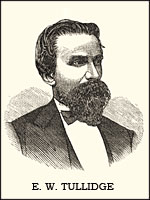
|
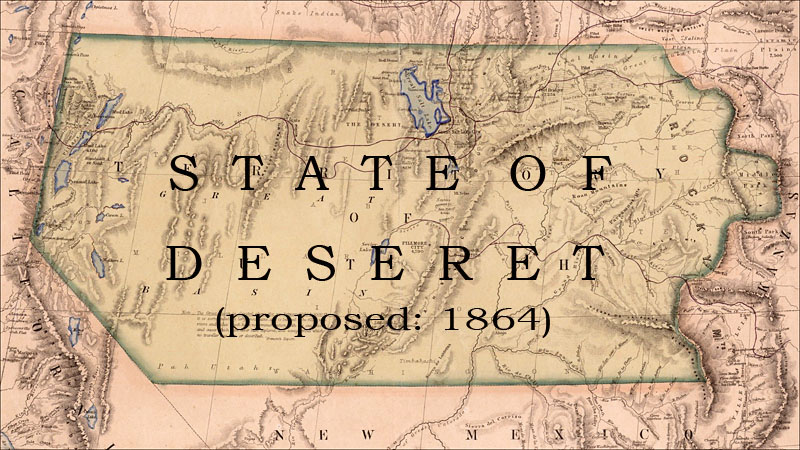
 ~ Prominent Non-Mormons in Utah Territory, 1857-1877 ~
~ Prominent Non-Mormons in Utah Territory, 1857-1877 ~

